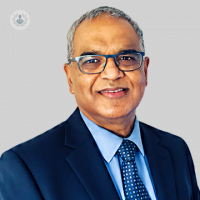Rapid-fire questions about cataract surgery
Written by:Cataracts affect hundreds of thousands of people in the UK each year. In fact, statistics demonstrate that approximately 330,000 cataract operations are performed each year in England alone. We speak to highly regarded consultant ophthalmologist Mr Sivanandy Nagendran, who answers the most commonly asked questions about the condition.

What is cataract surgery?
Cataract surgery is a widely performed and highly successful procedure designed to address cataracts, which are characterised by the clouding of the eye's natural lens.
The procedure includes the extraction of the cloudy lens, followed by the placement of an artificial intraocular lens (IOL) to restore clear vision.
What are the symptoms of cataracts?
Symptoms of cataracts may include the following signs and symptoms:
- Blurry or cloudy vision.
- Increased sensitivity to light.
- Difficulty seeing at night.
- Seeing halos around lights.
If you experience any of these symptoms, it is essential to consult an eye care professional for an examination.
What are the risks of cataract surgery?
Cataract surgery is generally safe, but as is the case with any surgery, it carries a certain degree of risk. Potential complications include infection, bleeding, or a reaction to anaesthesia.
That being said, serious complications are rare. Before undergoing the procedure, you will have a discussion with your surgeon regarding the risks and benefits of the surgery.
How do I prepare for cataract surgery?
Before cataract surgery, your eye doctor will conduct a thorough examination to assess your eye health and discuss any pre-existing conditions. You may need to stop taking certain medications, but your surgeon will provide specific instructions about fasting before the surgery.
What happens during cataract surgery?
Cataract surgery is usually an outpatient procedure, and you will be awake but relaxed during the surgery. The surgeon will make a small incision, remove the cloudy lens, and insert the new IOL. The procedure is quick, typically taking less than 30 minutes.
What to expect after cataract surgery
After surgery, you may experience some mild discomfort. However, this is completely normal and usually temporary. Your surgeon may prescribe eye drops to prevent infection and promote healing.
It is crucial to follow post-operative care instructions for the best outcomes.
How long does it take to recover from cataract surgery?
The majority of patients will experience improved vision within a few days after surgery, but full recovery may take several weeks.
It may be essential to avoid strenuous activities and protect your eyes from bright lights during the initial recovery period.
Are there any alternatives to cataract surgery?
In today’s society, cataract surgery is the most effective treatment for cataracts. There are no medications or lifestyle changes proven to reverse or prevent cataracts.
However, regular eye exams and early detection can help to manage cataracts and ensure timely intervention if surgery becomes necessary.
If you are suffering from cataracts and would like to book a consultation with Mr Nagendran, do not hesitate to do so by visiting his Top Doctors profile today.


